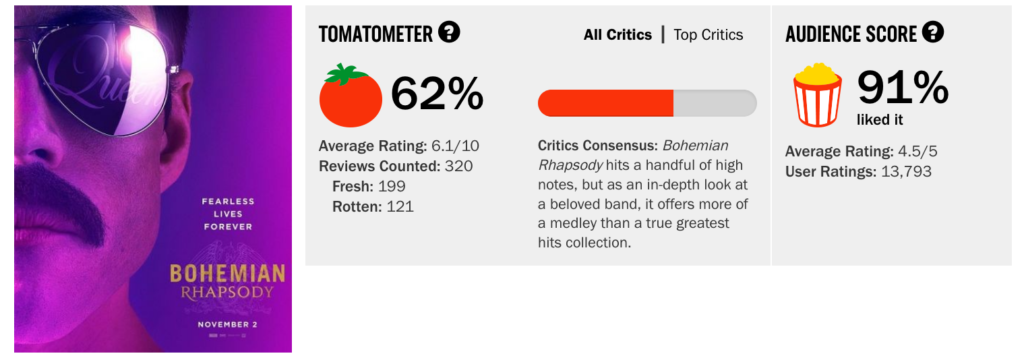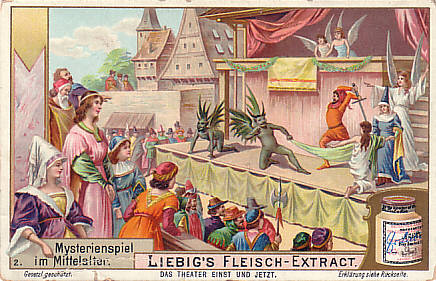The Bottom Line: Drop everything, turn off your phones and go see “Bohemian Rhapsody” immediately. The critics are wrong. It’s fantastic.
More details:
I have a pet theory that critics—subject matter experts of all sorts, really—get so into the weeds of the production of the material they critique that they lose track of why ordinary folks do things like go to the movies, listen to music, read books and the like.
Expertise can be a liability.
Nowhere is this more true than with “Bohemian Rhapsody” (stop reading: go see it now) the Freddie Mercury and Queen biopic that is still in the theaters but has suffered from bad reviews. The movie has done well financially ($155M in the U.S. plus $329M internationally on a $52M budget, according to Box Office Mojo), but Rotten Tomatoes synthesizes a 62% critical score:

And Metacritic‘s number is still more dire at 49%:

Note, however, the disproportionately high numbers from actual moviegoers, the people who plunk down their hard-earned cash: 91% of Rotten Tomatoes users liked it, and the Metacritic user score is 8.3 of 10, or 83%.
What’s going on?
Enough people have talked about Rami Malek’s astonishing performance as Freddie that I don’t need to go into that here (just watch the trailer, then go see the movie). The music is incredible. The characters are indelible. What I want to dig into is why the reviewers got this one so wrong.
Movie critics go into the theater with a job to do, whereas moviegoers walk into the theater when their jobs are done for the day. Last night, my wife Kathi and I finished our last out-of-town meetings a bit earlier than we expected and stumbled into a surprise oasis of time.
The movie—which we’ve been trying to see since it opened—was playing next door to our hotel. The Yiddish word for this is bashert, or meant to be. The movie swept us away from our workaday lives, whereas for movie critics that is their workaday.
Kathi and I talked about the movie for a long time after, but we were under no obligation to do so. Movie critics may have once loved movies—otherwise why get into that business?—but going into theaters today they are reporters on assignment. Their criteria when watching a movie is, “what can I say about this flick?,” which is a lot different than just letting the story happen to you.
I have experience with this.
Years ago, I was a Hollywood story analyst, reading hundreds of scripts per year and seeing as many movies as I could. On one hand, it was a terrific experience, since I love movies. On the other hand, I could never stop being a story analyst, even when I watched something for pleasure. To the particular consternation of my frequent moviegoing buddy David, the moment the credits rolled I’d be tearing the movie apart, pointing out plot holes, wondering why the director had made one choice over another.
There was a distinct pleasure in exercising mastery over the form, in having the ability to see deeply into how a movie worked or didn’t work. But that pleasure, the analyst’s pleasure, the critic’s pleasure, has a different shape than the pleasure that Kathi and I experienced last night watching “Bohemian Rhapsody.”
Later, as we talked about the movie, Kathi (who is an English professor) talked about how it was not only a biography of Freddie Mercury but that it was also a movie about the nature of creativity, particularly collective creativity, and that the movie’s emphasis on Queen as a family pleasantly surprised her.
Saint Freddie
I later found myself thinking about the film as an exercise in hagiography, which describes the lives of saints. No priest would describe Freddie Mercury as a saint in the typical sense, but saints lives aren’t about plot: they’re about holiness. Anybody who has affection for Queen’s music knows how the Mercury story ends, so “Bohemian Rhapsody” isn’t about plot. It’s about a different kind of holiness: how music can touch people, bring them together, and the mesmerizing, transformative power of live performance. That’s harder to talk about than plot: the criteria for evaluating a saint’s life are different than how we evaluate a more conventional story, even another biopic.
The closest generic model to how “Bohemian Rhapsody” works that I can think of is the medieval mystery plays that rehearsed biblical events in (what was then) contemporary dress. Here’s an illustration: 
Everybody in the mystery play audience knew how the stories ended: plot wasn’t the point. The point was to bear collective witness to the story in real time and also to inscribe or re-inscribe the power of that story on each individual’s life.
That’s not how most movies work, and so it doesn’t surprise me that most movie critics missed what makes “Bohemian Rhapsody” so special.
Remember to Forget
One of the most important jobs of a critic or an editor or an analyst is, sadly, a job that frequently gets forgotten, and that job is to remember and to forget. The remembering is that the everybody moviegoer or reader or listener or customer doesn’t have the vast basis for comparison and evaluation of the expert. The forgetting is the ability to let that expertise drop away and to see the thing, whatever it is, as if for the first time.
In my experience, the person with the best ability to do this was my old boss Tom Sullivan.
Tom was the editor-in-chief when we both worked at EarthLink in the earliest days of the internet. I was his digital editor. Whenever we would collectively evaluate an article, a web page, an ad, a piece of collateral, Tom would point out a part of whatever-it-was that contained information that the readers or customers would not have. “Only EarthLink members know that,” or, “the customer doesn’t have that information.” Then we’d have to go back and rework to make the piece understandable to everybody. It was uncanny.
I don’t think I’ll ever be as good as Tom is at this sort of remembering-to-forget, but I carry a little Tom Sullivan around in my head that I can consult when I’m evaluating something, whether it’s a column like this one, a presentation I’m giving, a report I’m writing.
I’ve often shared the Tom story with my own employees as a way of explaining to them the real benefit of working closely for another person (aside from the money, of course). You get to learn how another person thinks, and then you get to carry that way-of-thinking around in your head as a distinct point of view for the rest of your career.
But the real point of this article is a simple one: go see “Bohemian Rhapsody.”
Leave a Reply